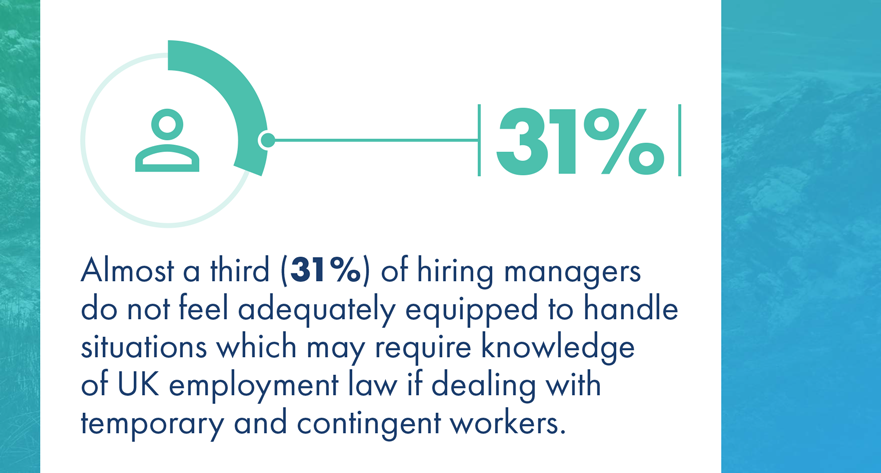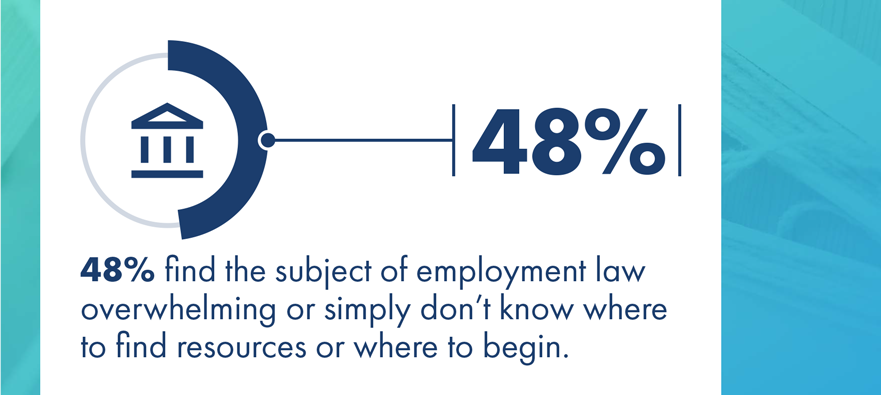
Thriving in a Changing Legal Landscape
06 Feb, 20245 minutesThriving in a Changing Legal Landscape Temporary and contingent workers play an increas...

Thriving in a Changing Legal Landscape
Temporary and contingent workers play an increasingly important role in the modern workforce, but new research suggests hiring managers do not feel adequately equipped to handle the legal aspects of contracting and HR management of these groups. This article will identify their concerns and examine how services like Managed Service Provider (MSP) could help resolve this industry-wide issue.
To better understand their concerns, we surveyed 300 UK managers with hiring responsibilities in their current role to determine how comfortable they are with the current employment law for contingent workers and what they view as the roadblocks preventing them from staying up to date.
Clarity over contingency
On the surface, the differences between permanent UK employees and contingent workers appear to be fairly pronounced. However, employment laws are continually evolving and are less clearly defined for contingent workers, meaning that the finer details must constantly be monitored to ensure that contingency workers are correctly receiving the benefits and conditions they are entitled to.
While 94% of hiring managers agree there should be increased clarity regarding the legal distinctions between permanent employees and temporary/contingent workers, almost one-third (31%) do not feel adequately equipped to handle situations requiring knowledge of UK employment law relating to contingent and temporary working.
This is a major concern as failure to comply can result in penalties – In June 2023, the UK Government named 202 employers who were found to have breached the National Minimum Wage (NMW) law, leaving around 63,000 workers out of pocket. The employers were ordered to repay workers and faced almost £7 million penalties.

What training is currently being provided?
98% of hiring managers surveyed felt it is important to have someone with a knowledge of employment law relating to temporary and contingent workers as part of the recruitment process, but in many cases, it doesn’t seem to be them - only half (56%) of hiring managers receive regular training on employment law from their workplace.
Training, including refreshing knowledge and updates based on changes to related laws, is provided to the majority, but the frequency varies: 56% said it was provided on a monthly or quarterly basis, but for more than a third of respondents (36%), training is only provided when necessary.
| How often does your workplace provide training on employment law? | Percentage |
|---|---|
| Monthly | 19% |
| Quarterly | 27% |
| As and when necessary | 36% |
| Annually | 10% |
| Never | 5% |
| Don’t know | 3% |
A similar amount, nearly one-third (31%) said they felt that a lack of training provided by their employers would prevent them from learning, reading or consuming information and content on employment law regularly, and that seems to be the case as just one-in-five (20%) hiring managers said they regularly consumed content on consumer law.

Out of a variety of appropriate investments, such as qualifications, external training, and resources, hiring managers identified in-house training as the highest priority to keep those involved in recruitment informed on updates to UK employment law, specifically relating to temporary and contingent workers:
| What do you think businesses should prioritise to keep HR & recruitment informed on updates to UK employment law, specifically regarding temporary and contingent workers? | Percentage |
|---|---|
| Invest in in-house training for employees | 26% |
| Provide either in-house or outsourced legal support | 21% |
| Invest in relevant qualifications and certifications for employees | 16% |
| Provide internal resources and/or centralised library of content | 14% |
| Invest in external training for employees | 11% |
| Invest in external resources and/or content, i.e. relevant subscriptions | 11% |
Keeping up with the legal requirements of contingent recruitment
Even those with regular training believe they would still find it difficult to stay up to date with the legal requirements of contingent recruitment. The main reason for this, identified by 49%, is that other requirements in their jobs would prevent them from learning, reading or consuming information and content on employment law on a regular basis.
Almost half also identified anxieties around the topic. While they understand the importance of keeping pace with contingent worker employment laws, 48% said they would struggle to keep up to date because they find the subject overwhelming or simply don’t know where to find resources or where to begin.

Avoiding potential pitfalls
The issue of not knowing where to begin is understandable considering the range of legal pitfalls hiring managers have identified:
| What do you consider to be the biggest potential pitfalls when it comes to the legalities around recruiting temporary and contingent workers? | Percentage |
|---|---|
| Contract and termination issues | 42% |
| Employment benefits | 32% |
| Hours and overtime violations | 29% |
| Rights to flexible working | 28% |
| Discrimination and harassment | 26% |
| Lack of employment contracts | 26% |
| Health and safety in the workplace | 23% |
| IR35 tax rules | 23% |
| Tax and National Insurance contributions | 23% |
| Data protection and access rights | 19% |
| Wage violation | 11% |
Ensuring that the temporary and contingent workers are legally supported and receiving the correct benefits is a complicated process that requires a close eye to make sure existing rules are being adhered to, while also swiftly adjusting when laws change. The biggest challenge is ensuring that teams have the resources available to manage and monitor this wide range of considerations.
Current information sources
A majority (69%) believe they have a strong knowledge of UK employment law, but 30% said they do not have the required knowledge and therefore rely on their support teams. When looking for advice and information on temporary and contingent workers, most hiring managers surveyed said their primary option would be to talk to their in-house HR (56%) or legal team (46%).
| Where would you prioritise seeking advice and information on employment laws related to temporary and contingent workers? | Percentage |
|---|---|
| In-house HR team | 56% |
| In-house legal team | 46% |
| Official governing or sector-specific body (e.g., CIPD, ACAS) | 38% |
| HR speaker events | 19% |
| Web search | 17% |
| Trade and industry-specific media, including HR titles | 17% |
| Outsourced legal team | 16% |
| Business owner, Managing Director, or CEO | 16% |
| Contingent Workforce Managed Service Provider | 11% |
| Outsourced HR team | 10% |
| Mainstream media | 8% |
| HR podcasts | 8% |
| Social media | 5% |
Solution
Insufficient training, uncertainty over where to seek guidance and limited capacity between other responsibilities are all combining to make hiring managers feel unequipped or simply that they are not in a position to effectively manage the legal aspects of temporary or contingent workers’ employment. But following the shift towards more contingent and temporary workers being employed by UK businesses in recent years, this group is becoming increasingly important. So, what alternative solution is available to ensure they are effectively managed?
Managed Service Provider (MSP)
A Managed Service Provider service is used as a strategic partner to manage specific areas of your business to improve operational efficiency. This includes access to their expert teams who will specialise in compliance across existing and future changes to employment law regulations.
In this case, the MSP would focus on not only identifying and recruiting skilled temporary talent for your contingent workforce, but also managing the contract arrangements of staff. This approach means that the pressure to provide training and reduce the employment law knowledge gap is removed from your hiring managers and HR teams while ensuring consistency across a changing employment landscape.
How Cpl’s Talent Evolution Group can help
Áine Fanning, Managing Director at Cpl’s Talent Evolution Group, said, "Hiring managers and organisations must take different legal approaches for contingent and temporary workers in comparison to other employees, such as full-time workers – further confirming the need to close the employment law knowledge gap in relation to contingent and temporary workers. This can be done internally or with the help of an agile MSP solution from Cpl’s Talent Evolution Group.”
If you face complex talent acquisition challenges with your contingent workforce, Cpl’s Talent Evolution Group’s Managed Service Provider (MSP) services could be the answer. Contact us to discover how we can meet your recruitment needs.


